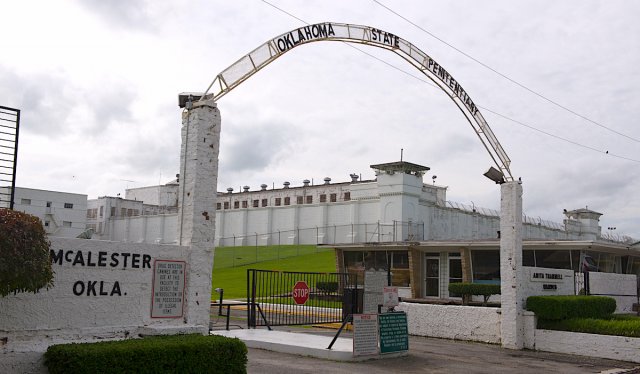
Oklahoma will resume executions after a multi-year pause in that form of punishment, Gov. Kevin Stitt, Oklahoma Attorney General Mike Hunter and Oklahoma Department of Corrections director Scott Crow announced today.
Hunter said the resumption of executions comes after the state secured a reliable supply of the required drugs for lethal injection. More than five years have passed since the state last executed a death-row inmate, an event that was mishandled and caused a national media firestorm.
The state will use an updated version of the previous protocol that includes recommendations by a 2016 multi-county grand jury. The three drugs that will continue to be used are: midazolam, vecuronium bromide and potassium chloride.
“It is important that the state is implementing our death penalty law with a procedure that is humane and swift for those convicted of the most heinous of crimes,” Stitt said in a press release. “Director Crow and Attorney General Mike Hunter have worked diligently and thoroughly to create a path forward to resume the death penalty in Oklahoma, and the time has come to deliver accountability and justice to the victims who have suffered unthinkable loss and pain.”
Hunter said the state would begin requesting execution dates for death row inmates who have exhausted their appeals after 150 days. Currently, there are 47 inmates on Oklahoma’s death row, and more than half have exhausted their appeals.
Although the state previously announced a move to nitrogen hypoxia as the preferred method of execution, the 2015 law allowing the state to develop a method for nitrogen hypoxia specifically states death sentences shall be carried out by nitrogen hypoxia only if the drugs for lethal injections are unavailable.
Hunter said it’s time to resume capital punishment.
“My commitment to Oklahomans who remain tormented by the loss of their loved ones has been that we would go any route necessary to resume executions as expeditiously as possible within the rule of law,” Hunter said in his release. “They have endured enough through the decades of waiting on the lengthy appeals process and the state’s attempts to get the protocol right.”
Controversial executions led to pause
In 2014 and 2015, state officials came under fire for the lethal injection of multiple inmates during that time. The state executed Clayton Lockett on April 29, 2014. The drugs used by the state in that execution caused Lockett to convulse, speak and attempt to rise from the table over a 15-minute period after the drugs had been administered, according to some accounts.
Nine months later, the state executed Charles Warner with another combination of drugs. Warner said he felt his body “was on fire” during the process.
The two executions gained international attention, and officials were heavily criticized by anti-death penalty advocates.
Announcement criticized by death penalty opponents
Reaction to the announcement from death penalty opponents was swift. Oklahoma City Archbishop Paul Coakley said using public money to execute inmates is immoral.
“We need to stop spending taxpayer money to kill human beings,” Coakley said in a statement. “We deserve justice for these heinous crimes, but we don’t end the cycle of violence by committing more violence. In all of these cases, we lost a life, and the death penalty only serves to further devalue human dignity. We have the capability now to punish criminals and protect society without killing in return.”
ACLU Oklahoma director Ryan Kiesel also criticized the resumption of executions.
“There is simply no humane way for the government to kill its people,” Kiesel said. “Oklahoma’s experiment with the death penalty is a miserable and grisly failure. Death sentences are handed out arbitrarily and magnify the biases that exist within our criminal legal system. Whether someone is executed depends more on which county they happen to be in, their race or gender, the race or gender of the victim and whether they had the financial means to hire adequate legal counsel. Statistics have shown that more than 10 percent of the people with a death sentence have been wrongfully convicted.”
Rep. Jason Dunnington (D-OKC) filed HB 2876 this legislative session, which would eliminate the death penalty as a sentencing option moving forward. He said the decision to reinstate the executions is hypocritical.
“A state that in the past few weeks has essentially taken a victory lap of how pro life we are, we now are rolling out the next iteration of the death penalty in the State of Oklahoma, and I don’t think those two things coincide,” Dunnington said at the Capitol.
Dunnington said the cost of executions and the possibility of error are valid reasons for opposing state executions.
“One in nine people on death row across the country has been exonerated,” he said. “We know that there are lots of problems. We know there is racial injustice in that system as well. But if that’s not enough for someone — that one in nine — then I’d go to the fact it costs us twice as much to do this and it’s not a deterrent to crime.”





















